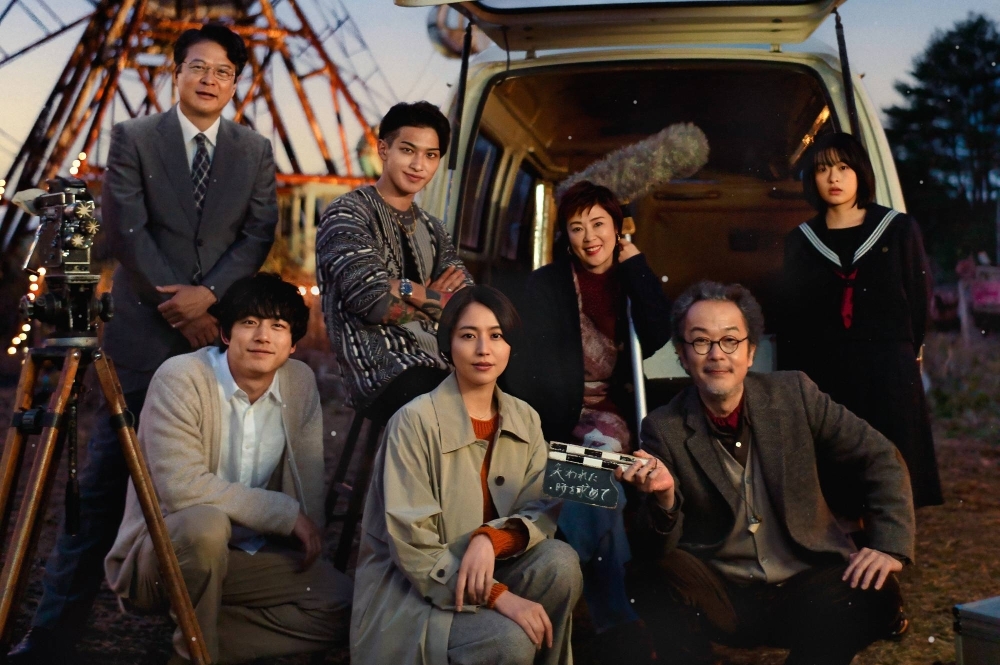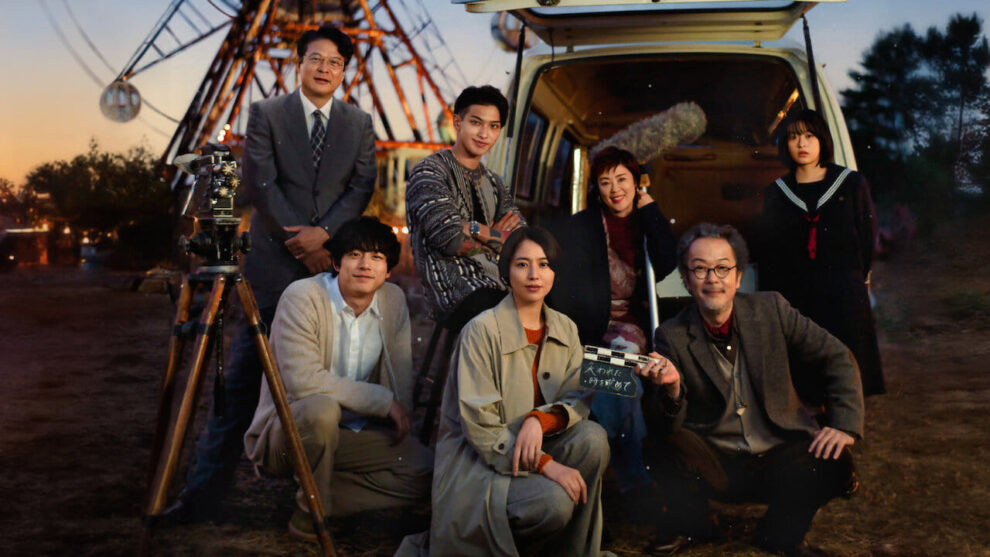==
==
==
CULTURE / Film
‘The Parades’: Glossy afterlife drama is no ‘After Life’

A group of departed souls trapped in limbo tries to find closure — and finish an uncompleted movie — in Michihito Fujii’s “The Parades.” | © NETFLIX
By James Hadfield
Contributing writer
SHARE
Feb 29, 2024
What awaits us when we cross the great divide? In writer and director Michihito Fujii’s “The Parades,” departed souls with unfinished business in the land of the living are left to dwell in a limbo that looks like it was dreamed up by an Instagram influencer.
The main setting for this glossy Netflix original is an abandoned holiday camp with dinky bungalows and an al fresco bar, overlooked by a Ferris wheel festooned with lanterns. It’s equal parts music festival, wellness retreat and “Terrace House” — somewhere to chillax while contemplating eternity.
This is where Minako (Masami Nagasawa), a TV reporter and single mother, finds herself after perishing in the 2011 Great East Japan Earthquake. She’s desperate to know if her young son survived the disaster and bewildered by the casual attitude of the other residents — who include a writer (Kentaro Sakaguchi), a former yakuza (Ryusei Yokohama) and a bar hostess (Shinobu Terajima).
By day, the ghosts are free to wander among the living, revisiting homes and workplaces; one of them even attends his own death anniversary. At night, they sing karaoke, share some nabe hotpot and sink a few drinks. They can only move on to the next realm once they’ve made peace with their regrets and obligations to those they left behind.
Once a month, the spirits scattered across the land gather to help each other find the people they’ve been looking for, both living and dead. How this actually works is never explained, although it allows for a few attractive sequences of torchlit processions, accompanied by an emotive soundtrack by Radwimps frontman Yojiro Noda (not the only point at which the film recalls anime heavyweight Makoto Shinkai).
For most of the characters, these reunions are all it takes to achieve closure. One exception is a garrulous movie producer calling himself “Michael” (Lily Franky), who resolves to complete his unfinished masterpiece. It’s a semi-autobiographical drama inspired by his student activist past and the great love he left behind, which Fujii depicts as a film-within-a-film featuring Ayumu Nakajima.
This provides opportunities for some paeans to the magic of cinema and a few sequences that could have been lifted from Hirokazu Kore-eda’s “After Life” (1998), another fantasia in which the deceased re-create moments from their lives on celluloid. “The Parades” is just as gentle as Kore-eda’s movie, but it doesn’t reach the same depths, either in its meditations on mortality and memory or on the nature of film itself.
If Franky’s character seems oddly specific in a movie that otherwise tends toward the generic, that’s because Fujii had a real person in mind: producer Mitsunobu “Michael” Kawamura, who died in 2022 and is credited as “project initiator” here.
Kawamura had a taste for more pungent fare, including Fujii’s “The Journalist” (2019), a gutsy political drama that won the Japan Academy Prize for best picture. I’m not sure what the producer would have thought of this tribute, which is closer in tone to Yoji Yamada’s dewy-eyed “It’s a Flickering Life” (2021).
Fujii at least doesn’t get overly sentimental: “The Parades” may be bathed in a warm glow of nostalgia, but it resists mawkishness. Still, Michael is probably overselling things when he tells his companions: “TV shows come and go, but films are unforgettable.” Not this one.
The Parades (Paredo)Rating
Run Time 132 mins.
Language Japanese
Opens Streaming on Netflix from Feb. 29
KEYWORDS
==
Movie Nation
Roger Moore's film criticism, against the grain since 1984.

Skip to content
← Next screening? An immigrant finds a crazy art world outcast “Problemista” solution
Movie Review: “Kung Fu Panda” comes back for Fourths →
Netflixable? Japan’s ghosts join “The Parades” in search of reconciling their life’s regrets
Posted on March 6, 2024 by Roger Moore



Slow moving and unmoving in the bargain, “The Parades” is a sentimental Japanese exercise in world building in the supernatural.
There’s a taste of “The Sixth Sense,” a hint of Pirandello’s “Six Characters in Search of an Author” and a lot of Rod Serling’s “Five Characters in Search of an Exit” in this downbeat fantasy about purgatory and the unfinished business, the “regrets” of the dead.
Writer-director Michihito Fujii (“A Family” is his best-known credit) emphasizes tone over pace and creates a movie of gently challenging twists, wish fulfillment fantasy and characters and performances so flat that there’s little incentive to finish “Parades,” or stay awake through it as you do.
Masami Nagasawa, star of “Mother,” is Minako, a woman we meet in the middle of a beachside reverie. She is abruptly swallowed by the sea. A “tsumani” we figure.
But she wakes up and starts searching for her little boy, Ryo. We learn she’s a single mom. We figure out she is a TV reporter. We’ve guessed which earthquake and tsumani hit her.
And by noticing her immaculate outfit that somehow survived, unblemished, by the second or third rescue worker who ignores her pleas, people she cannot grab to get their attention, we’ve figured out she’s dead. She quicky reasons out that she’s not the only ghost wandering the ruins of this disaster’s aftermath.
It’s only when she flags down a van driven by Akira (Kentarô Sakaguchi) that Minako starts to piece things together. He drives her to a ruined amusement park, with a functioning bar and tiny bungalows for living space. It’s an emcampment of the undead, dead people with “regrets.”
There’s the filmmaker (Lily Franky) who failed to complete his final film, set against student protests in Okinawa during the Vietnam War. A yakuza (Ryûsei Yokohama) didn’t live long enough to inherit his father’s gang or make a life outside of it with his bride. The upbeat bar owner (Shinobu Terajima) sadly checks in on her many children, the pregnant daughter whom she hopes to see give birth, even if she’s not literally “alive” to savor it.
A banker (Tetsushi Tanaka) is cagier about his past. And the newcomer (Nana Mori) with a schoolgirl’s uniform and a slit wrist barely needs to tell us her story. We can guess.
Every so often, these ghosts join others in “parades” to recognize their plight.
Minako has a hard time fitting in, because these people are “lazy” and incurious — stuck in place, some of them for years and years. They’re not settling their “regrets,” not moving on, not that curious about “What’s on the other side.”
But the filmmaker Michael has thoughts of finishing his final film in the afterlife. Akira is taking extensive notes about their netherworld, hoping to pass them on to the living. Minako is just looking for answers, hoping to find her boy still alive and figure out a way to speak to him.
Advertisements
Report this ad
There is most definitely a movie in this material, even if it’s mostly recycled afterlife fantasies — a “Sixth Sense” without the scares or big twist, “It’s a Wonderful Life” or “Heart and Soul” without the humor, joy or heartbreak.
Scene after scene drags on past its usefulness. We “get” the tone, and yet are then subjected to 132 minutes immersed in that tone telling about 90 minutes worth of story.
Hell isn’t serenely dull films like “The Parades.” But I’ll bet purgatory is.

Rating: TV-MA, adult themes, suicide
==
Features•Japanese Reviews•Netflix•Reviews
Film Analysis: The Parades (2024) by Michihito Fujii
Online movie streaming services
Panos Kotzathanasis

"Regrets is all we have"
Michihito Fujii has been working like a factory lately for Netflix, with the majority of his latest works featuring in the streaming service, including “Ghost in the Shell: SAC_2045”, and the more recent “Hard Days” and “Village” among others. His latest work, however, signals a change to a “tamer” narrative, as “The Parades” is a drama about the afterlife, inspired by the Fukushima disaster.
Click the image below to follow our Tribute to Netflix

Minako, a TV reporter and single mother, finds herself roaming the area she lived in after the 2011 Great East Japan Earthquake, in search of her lost boy. Soon she realizes though, that she is dead and that the living cannot see or hear her. While getting totally lost about her new reality, she is discovered by Akira, a writer who is in the same situation, who takes her under his wing and introduces her to his “gang” who live around a bar, run by Kaori. A former yakuza, Katsutoshi, a movie producer, Michael, a banker, Tanaka, and eventually a high school student, Nana are all part of a group who have realized that they can move to the next realm once they’ve made peace with their regrets and obligations to those they left behind. Lingering somewhere between wishing to stay in this half-living state for longer and settling their loose ends, the group help each other in all aspects, becoming intimate friends in the process. Gradually, Minako adapts to her new situation, while also becoming a “mentor” for Nana.
One of the most evident elements here is the anime references (inspirations or loans if you prefer) with the bar in between worlds ‘winking’ at ‘Bartender” and a number of other elements reminding intently of Makoto Shinkai‘s works, with the parade that takes place with every new moon, in the most visually impressive sequence in the movie, being the most evident aspect.
Check the interview with the director
Apart from that, and as it becomes evident from the synopsis, the story follows the background of the protagonists, each of whom presents an aspect of Japanese society, although eventually the narrative focuses more on their family situation. In that fashion, Katsutoshi functions as the ‘representative’ of the organized crime; Kaori, the woman focused on family, Akira the publishing sector, Minako the press, and Nana, the school environment, which inevitably moves into the topic of bullying and suicide. While all these side stories move towards family and love eventually, Michael’s and his will to finish the last movie he was shooting becomes the focal point here, with the members of the group finding relief by helping him achieve his goal, with his arc also representing how the movie industry works. Again expectedly, his goal is revealed to be about love in the end too, although to a lesser extent.
It is also this part that becomes the main medium of nostalgia, which emerges as one of the central elements of the narrative. Michihito Fujii handles it quite well, as he does with the drama and the various arcs, which may move to sentimental and cliched paths on occasion, but are definitely measured, not hitting the reef of the melodrama, at least for the most part.
Also of note here is the rapport among the characters, which owes much to both direction and writing, and the acting and casting, which includes some of the most likable (and famous) actors in the local industry at the moment. Masami Nagasawa highlights her transformation rather nicely as Minako, while Kentaro Sakaguchi as Akira handles the nice guy who has left his crime past behind equally well. Ryusei Yokohama as Katsutoshi is convincing as the kind and calm man with regrets, with his chemistry with Nagasawa, within the inevitable romance, being among the best parts of the movie. Shinobu Terajima plays the kind ‘mama-san’ excellently, while Nana Mori portrays the angry teenager who mellows quite nicely. The one who steals the show, though, is Lily Franky as the producer with the stutter, with his arc being the biggest and the most central one in the movie, and him carrying the whole thing in the best fashion, presenting, as almost always, a character that everybody would like to hang out with.
Evidently, there are too many arcs and characters here, and Fujii, even in the 132 minutes the film lasts, does not manage to develop them all properly, with the mentions of the student protests of the 60s for example, being a tad excessive in their inclusion. It seems that the film also functions as a kind of homage to Japanese cinema (and the country’s history to a point) but this aspect does not work particularly well. Furthermore, the issues modern Japanese cinema exhibits are also present. Almost complete lack of tension, lagging throughout the movie, and the ever-present scenes by the sea out of nowhere can be found here in all their glory.
On the other hand, the dystopian setting with the bar and the impressive houses the protagonists live in is quite appealing to watch, with Keisuke Imamura’s cinematography presenting them in excellent fashion, and the scenes with the parade definitely staying on mind. The editing results in a mid-tempo that fits the multi-arc story, although, as mentioned before, there are unnecessary scenes and lagging throughout.
All in all, one could say that “The Parades” incorporates all the good and the bad of contemporary Japanese cinema, but definitely succeeds in one very important factor, of putting a smile on the face of its viewer, which is what deems the movie a success in the end.
==
The Parades Review: Emotional Journey is a Bit Too Lengthy
Copy URL

Archi Sengupta
February 29, 2024
Director, Writer Michihito Fujii
Cast Masami Nagasawa, Kentarô Sakaguchi, Ryûsei Yokohama, Lily Franky, Nana Mori
Runtime 132 minutes
Native Title パレード
Genre Drama
– No Spoilers –
In this gut-wrenching drama film, Minako finds herself utterly alone and heartbroken when, after a devastating catastrophe, she is unable to find her son. Soon, however, she realises why the people around her have been behaving in an uncharacteristic manner – she has died and is now stuck in between worlds, unable to find peace because of unfinished business. In her quest, she comes across others in a similar situation and go on a journey together.

This is an oddly emotional movie that might not cater to everyone at all times becuse of the subject matter and the way it is presented. It’s a calm and emotional journey that makes your heart heavy and sometimes uplifts your spirits. Misako is a character, who somewhat represents us in this movie – she’s confused at first and doesn’t understand what is happening to her and what this strange new world means. However, slowly, she opens up to her new aquantances who slowly become her friends. Her spirit lifts as she nurses the hope in her heart to find her son.
All of the supporting characters are rather heartbreaking representations of differnet people with different hopes and dreams and things that they want to achieve that have kept them where they are. They are real people with relatable struggles and moving emotions that feel close to home in many ways. Minako isn’t the only one hurting, all of these wandering spirits have an ache that needs to be attended to and we slowly learn of these predicaments through the motions of the film.
Unfortuantely, I think that is where the movie truly falters a bit and why a lot of people will turn away from it. In spite of the profound emotions being brought forth and difficult questions asked, The Parades gets a bit slow after a while. I get that the subject matter needs time and love to truly take shape and emotions can’t be rushed but there’s just a lot going on and at a very slow pace that loses its audience after a while. I guess loses is a strong word; I would say that the attention span starts to linger a bit, although it doesn’t totally lose you because you fall in love with the characters.

The backstories and the relationship among the characters are what really keep you somewhat tied to your screens and there were several moments when it made my heart leap out of my chest. As I mentioned above, all of the stories are so heartfelt and sincere that they touch your heart over and over again. There’s a lot of understanding and sweet banter that makes the experience whole, although the root of the story is that these stories are so heartbreakingly sad.
Beautiful performances of beautiful characters make for an emotional watch through and through. Although slow, the movie has its moments of intrigue and anticipation and leaves us wanting more. Some stories are given more time than others but even then, the uplifting and inspiring background score makes you wish for good things to happen in the lives of these people stricken by grief and misfortune but still with so much love and happiness to give.
The Parades Review: Conclusion

There’s something about The Parades that stays with you long after the runtime is over. The movie is long and sometimes the storyline gets a bit too stretched thin to cover the runtime but it’s a delight to watch if you feel like you need someone to understand your feelings. If you need a slow and emotional movie, this one will be good for the weekend with your loved ones.
The Parades is streaming on Netflix.
Also Read: Love is Blind Season 6 R
No comments:
Post a Comment